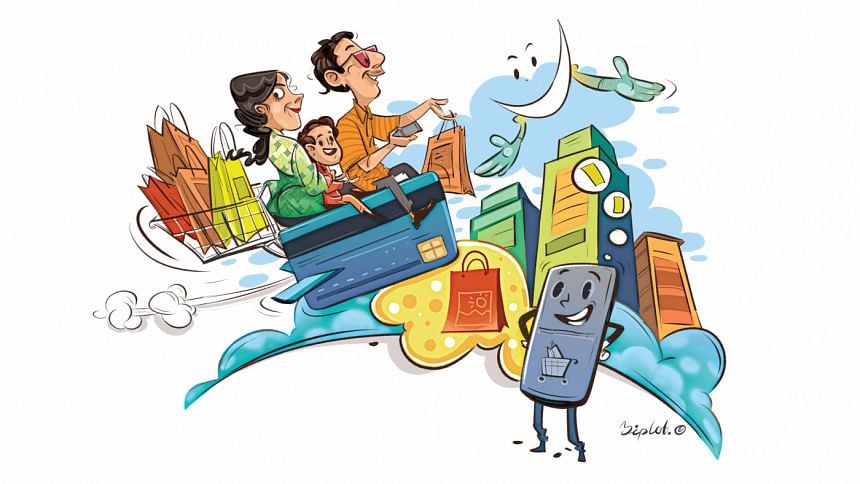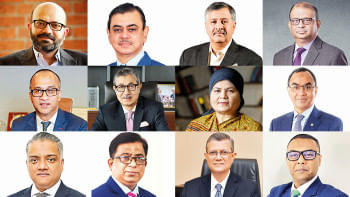Digital Bliss: Cashless spree for Eid

Sales continue to surge for lifestyle products, home appliances, electronics, and groceries in anticipation of Eid-ul-Fitr, the biggest religious festival and the pinnacle of business activity in Bangladesh. Enthusiastic shoppers are indulging in purchasing new attire and heartfelt gifts for their dear ones, along with essential ingredients for elaborate celebratory feasts.
Banks, MFS providers, and digital payment platforms are actively collaborating with lifestyle brands, supermarkets, restaurants, and hotels, offering enticing discounts, cashback facilities, and BOGO (Buy One Get One) offers for transactions made through cards or MFS apps. This collective effort between financial institutions and businesses aims to further encourage cashless transactions in Bangladesh.
Sabbir Ahmed, Managing Director and Head of Consumer, Private, and Business Banking at Standard Chartered Bangladesh, said, "There is an escalating trend of cashless transactions during Eid. This primarily happens because multiple dining, lifestyle, clothing discounts, and other benefits are offered by debit and credit card issuers as well as mobile financial services providers."
"These attractive offers and discounts encourage customers to complete their transactions through digital means instead of cash. We have seen that cashless transactions during Eid-ul-Fitr in 2022 and 2023 increased by around 13 percent and 16 percent respectively compared to non-Eid months," he added.
Joarder Tanvir Faisal, Head of Cards at Prime Bank, shared, "Cashless transactions are convenient and secured, particularly in crowded markets. Moreover, transferring money to loved ones is common, making cashless methods a safe choice, especially for distant transfers during Eid."
Saifur Rahman, Head of Cards at Bank Asia, said, "Bangladesh currently has one crore cardholders, of which credit cardholders remain at 18-20 lakh. Payment with cards during Eid-ul-Fitr increases more than at other times of the year impacting year-on-year growth."
Syed Mohammad Kamal, the country manager of Mastercard Bangladesh, stated, "The 30 days of Ramadan festivity, including Eid-ul-Fitr, holds immense significance for us as it is the largest festivity."
"We have rolled out numerous discounts and offers exclusively for our cardholders, anticipating a significant surge in transactions during the month of Ramadan," he said.
Based on data from the Bangladesh Bank, during the 2021 Eid, the total value of transactions with cards amounted to Tk 24,545 crores, conducted through 30.80 lakh transactions. In 2022, this figure increased to Tk 36,613 crores across 39.82 lakh transactions, and further rose to Tk 47,385 crores with 51.45 lakh transactions in 2023. These statistics illustrate the rapid evolution of digital payment systems within the country.
Shamsuddin Haider Dalim, Head of Corporate Communications and Public Relations at bKash, mentioned that the MFS industry has been experiencing substantial growth in cashless spending by customers for the last couple of years due to convenience in digital transactions.
"People spend more during festive seasons like Eid, special days, holidays, and at the beginning and end of the year. Amongst all, Eid is very special for people when they prefer shopping, buying products and services online, and cashless payment is the best option for them," he added.
Muhammad Zahidul Islam, head of media and communications at Nagad, highlighted that during Eid, increased gift and monetary exchanges among family and friends, heightened shopping activities, appealing cashback and gift offers, travel, and the assurance of safety collectively contribute to a substantial increase in cashless transactions compared to other times of the year.
Driving towards 100% cashless
"Currently, cashless transactions account for roughly 7 percent to 10 percent of total transactions. The government has a plan to increase this to 75 percent by 2027," said Sabbir Ahmed.
"We believe that with sufficient focus from all stakeholders, policy support, and a favorable ecosystem, Bangladesh can transform into a fully cashless economy," he added. "This may take some time, but if we collaborate across the financial ecosystem and breadth of our economy, this vision is achievable."
Md Mostaque Ahmed, Deputy Managing Director and CEMO at Dhaka Bank, remarked, "Achieving 100 percent cashless transactions is theoretically possible, but it would require significant changes in infrastructure, regulations, technology adoption, and societal behavior."
Saifur Rahman expressed, "It is a time-consuming task to move Bangladesh towards a cashless society because we are not yet accustomed to virtual currency. Many of us are still apprehensive about it. I know a few highly educated individuals who have stopped using their cards after making a transaction. Infrastructure hasn't been developed uniformly across the country; it remains concentrated in Dhaka, Chattogram, and Sylhet. You can't expect a 100 percent cashless society until we simplify the cashless culture by expanding infrastructure nationwide."
Mohammad Razimul Haque, Head of Cards at City Bank, stated that achieving perfectly 100 percent cashless transactions in the near future will be a herculean task. "We are making strides with digital payments like mobile wallets and QR codes, NFC payments, and wearables, but cash still dominates, especially in rural areas. Some challenges of a 100 percent cashless society still remain, including inadequate financial inclusion, insufficient digital literacy, merchant suppression, and infrastructure limitations."
"Our bank is strategically focusing on driving growth across various digital channels, including card transactions, mobile and internet banking, Bangla QR payments, and other digital means," shared Joarder Tanvir Faisal.
Syed Mohammad Kamal said, "A completely cashless economy might be an ambitious goal. However, striving for a 'cash-light' or 'less cash' society is certainly within reach."
Shamsuddin Haider Dalim mentioned, "Efforts are underway to increase the proportion of cashless transactions around the world, including Bangladesh. As part of facilitating customers to get accustomed to cashless transactions, bKash has introduced plenty of innovative financial services for their convenience."
"To accelerate the country's transition to a cashless society, we need a more conducive environment and policy support so that digital cash management can be simplified, and the extent of digital financial services spreads even further," shared Muhammad Zahidul Islam.
Barriers to cashless transactions
Bangladesh's swift digital advancement makes the idea of a cashless society entirely conceivable. Sabbir Ahmed stressed that the shift to cashless isn't a one-size-fits-all fix, but a collaborative endeavor reliant on innovation. He dispelled a prevalent misconception about digital payments, noting that while they may involve additional costs, cash transactions also incur expenses. The government allocates substantial resources to print, store, and safeguard cash, burdens that a cashless lifestyle could alleviate. Embracing digital payments promises savings in costs, time, and energy, necessitating unified efforts across the financial ecosystem and the broader economy to realize a cashless Bangladesh.
Sabbir Ahmed also highlighted the need for partners and aggregators to facilitate this transition, noting the emergence of such entities in Bangladesh.
Meanwhile, Mohammad Razimul Haque outlined various barriers obstructing cashless transactions, including infrastructure constraints, limited financial inclusion, technological hurdles, security apprehensions, digital literacy gaps, merchant reluctance, cultural biases favoring cash, and high transaction fees.
Syed Mohammad Kamal discussed additional obstacles from the perspective of card payment networks, citing issues like mandatory tax returns, high taxes on point-of-sale devices, and consumer awareness deficits. Md Mostaque Ahmed underscored a range of barriers, including infrastructure inadequacies, security concerns, the digital divide, and cultural and behavioral factors hindering progress toward a cashless society.
In summary, achieving a cashless society requires a multifaceted approach addressing infrastructure, regulation, security, and consumer behavior. While achieving 100 percent cashless transactions may not be immediately feasible, concerted efforts to overcome these obstacles can pave the way for increased digital payment adoption in the future.
What needs to be done?
The government has already taken a raft of measures to build a resilient cashless society across the country. Additionally, they can support by incentivizing cashless transactions, revisiting mandatory submission of PSR documents to issue credit cards, and increasing financial inclusion initiatives.
By implementing a combination of these strategies, the government can create a more favorable environment for cashless transactions, encouraging a gradual shift away from cash without leaving anyone behind," said Mohammad Razimul Haque.
Joarder Tanvir Faisal added, "Promising projections for cashless transactions in Bangladesh can be attributed to widespread smartphone and internet access, which bolster digital financial service usage. Government initiatives and financial institutions' efforts to promote digital literacy and inclusion are likely to drive adoption rates."
According to Sabbir Ahmed, the digital payments ecosystem also needs to be developed and strengthened, and policy frameworks for these, especially for risk controls, can be an area of focus for the government.
Md Mostaque Ahmed emphasized that collaboration among government agencies, financial institutions, technology companies, and other stakeholders is essential for the successful transition to a cashless society. Partnerships can help address challenges such as interoperability, security, and infrastructure development.

 For all latest news, follow The Daily Star's Google News channel.
For all latest news, follow The Daily Star's Google News channel. 










Comments